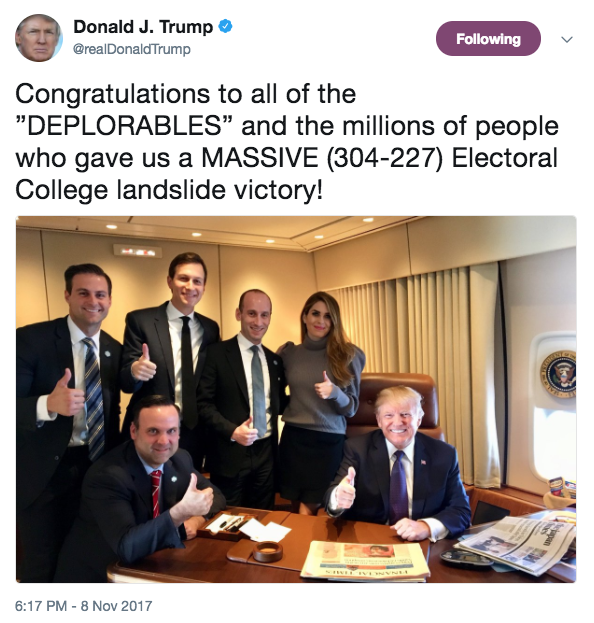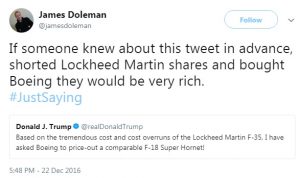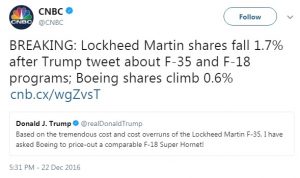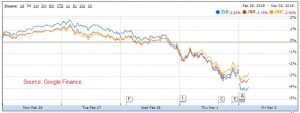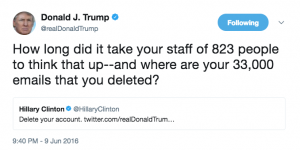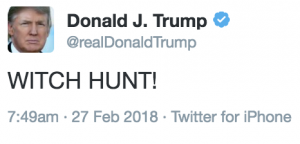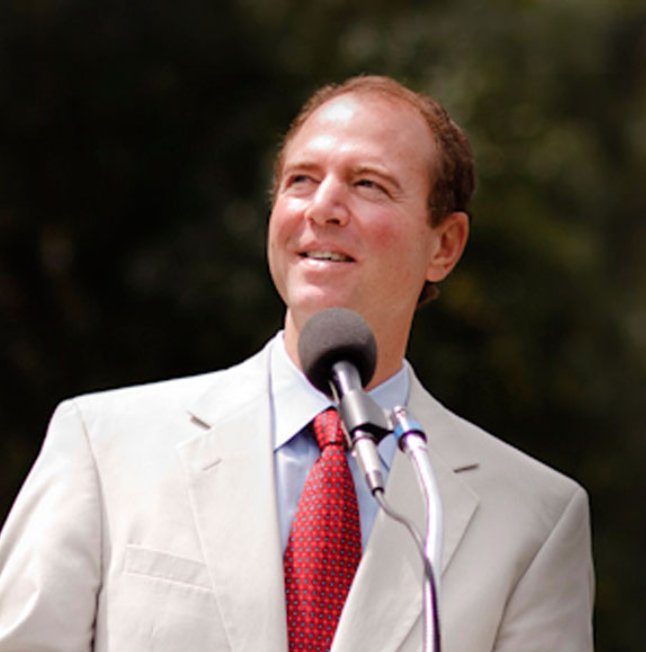The Competing Hope Hicks White Lies Stories
Since the NYT reported Hope Hicks admitting to telling white lies for Donald Trump in her House Intelligence Committee testimony Tuesday, the press has provided at least four different versions of the story. The competing versions make the exchange worthy of a public release of her transcript, though I doubt we’ll ever see that. So, particularly given that this exchange seems to have led Trump to bawl out Hicks, leading to her resignation, I wanted to lay out the competing versions here.
The first version, from the NYT and obviously telling the Democratic perspective, emphasizes Hicks’ consultation with her lawyers.
Hope Hicks, the White House communications director, told House investigators on Tuesday that her work for President Trump, who has a reputation for exaggerations and outright falsehoods, had occasionally required her to tell white lies.
But after extended consultation with her lawyers, she insisted that she had not lied about matters material to the investigations into Russia’s interference in the 2016 presidential election and possible links to Trump associates, according to three people familiar with her testimony.
The exchange came during more than eight hours of private testimony before the House Intelligence Committee. Ms. Hicks declined to answer similar questions about other figures from the Trump campaign or the White House.
CNN provides Chris Stewart’s version, which describes the Republicans providing her a way to answer a very narrow non-denial denial pertaining to “the Russian investigation” but not necessarily “Russia.”
“It truly was just a setup of this witness, who was trying to be forthright and honest,” Utah Rep. Chris Stewart told CNN’s Wolf Blitzer on Friday. “The question was so broad. It was, ‘In any circumstances, regardless of what it might be, have you ever felt any pressure to be deceitful or to be dishonest regarding any subject?’ And she answered it honestly. And that is, anyone in that circumstance, there is none of us in our lives that can say we have always been 100% honest.”
Stewart said upon hearing the question, his Republican colleagues intervened: “We realized that this was, frankly, just a setup and that it was designed to make a headline, so we asked her specifically — we interjected — we are talking about this investigation with Russia, regarding collusion or conspiracy, regarding the hacking of the DNC.”
After they narrowed the question to those areas, Hicks was “adamant,” he said, recalling that she answered: “‘No, absolutely not.'”
The WaPo, which provides the version of Eric Swalwell, who posed the question (as well as Peter King, but that’s far less interesting), describes that Hicks admitted to lying for Mike Flynn but stayed silent about every other Trump official.
The one exception she made, according to Rep. Eric Swalwell (D-Calif.), was acknowledging that former Trump national security adviser Michael Flynn had asked her during the transition period to dissemble about questions he was getting regarding his conversations with the Russian ambassador, Sergey Kislyak.
She claimed that she did not know she was being asked to lie but that she felt Flynn was being “dishonest,” Swalwell said.
Swalwell said Hicks did not answer when he asked why she would refuse to say whether other aides had asked her to lie when she was willing to speak about Flynn, or whether she had ever witnessed Trump asking others to lie for him.
And CBS provides the versions of Tom Rooney and another Swalwell version, which puts the question in immediate context of a Swalwell question about whether she was “loyal” to Trump (something asked of all close Trump aides in the wake of the Comey firing) and shows that Hicks’ lawyer offered up the “no with respect to the Russian investigations” line, one which Rooney then repeated.
Swalwell said — and Rooney acknowledged — that Rooney was not in the room for the very beginning of the questioning, which began with Swalwell asking Hicks about her relationship with Mr. Trump. He said he asked whether Hicks and Mr. Trump had a “typical” employer-employee relationship.
“She said, ‘Nothing is typical about it,'” given the number of hours she spends with the president and the nature of his role, Swalwell said.
He said he then asked if Hicks was “loyal” to the president, and she asked what he meant by the term.
“I think loyalty is being committed to somebody,” Swalwell said, and asked, in turn, if she was “committed” to the president.
“She said, ‘Yes, fully,'” Swalwell said.
It was then that he asked whether the president had ever asked Hicks to lie for him. Hicks and her counsel then conferred for “five to ten minutes,” and she responded, according to Swalwell, by saying, “I have never been asked to lie with respect to the Russia investigation.”
Rooney said he objected at the time to the breadth of Swalwell’s question and engaged in a “back and forth” with Swalwell and House Intelligence Committee Ranking Member Adam Schiff, D-California. Rooney asked aloud whether the question meant if Mr. Trump had ever asked Hicks to tell someone he was busy, or on the phone, or not around, or to answer, ‘Does this suit make me fat?’
An appropriate question, and one which would fit within the parameters of what the committee was investigating, Rooney said, would have been specific to its Russia investigation.
“So I asked her specifically with regard to the substance of our investigation,” whether she had been asked to lie, and she said ‘No,'” Rooney said.
The exchange comes in the wake of the report that Mueller’s team has been asking about Hicks’ comment, just after the election, that no one from the campaign had met with Russian officials. If Trump (or any of the other people listed by Swalwell) had asked her to lie then, it would not count as a lie about the investigation, though it would be a lie about Russia. Unless she, in turn, lied about the lie to Mueller’s people.
Presumably, Trump got so angry just because Hicks made him look like a liar, and not because he has thought through the implications of what Swalwell presumably has (and probably a few of the Republicans making excuses now).
But Hicks has now committed to a story that suggests the lie about the Sergey Kislyak conversation came from Flynn and not someone else, someone like Kushner or Trump himself, even while she has dodged answering about whether any of those other people asked her to lie about that or similar issues.

